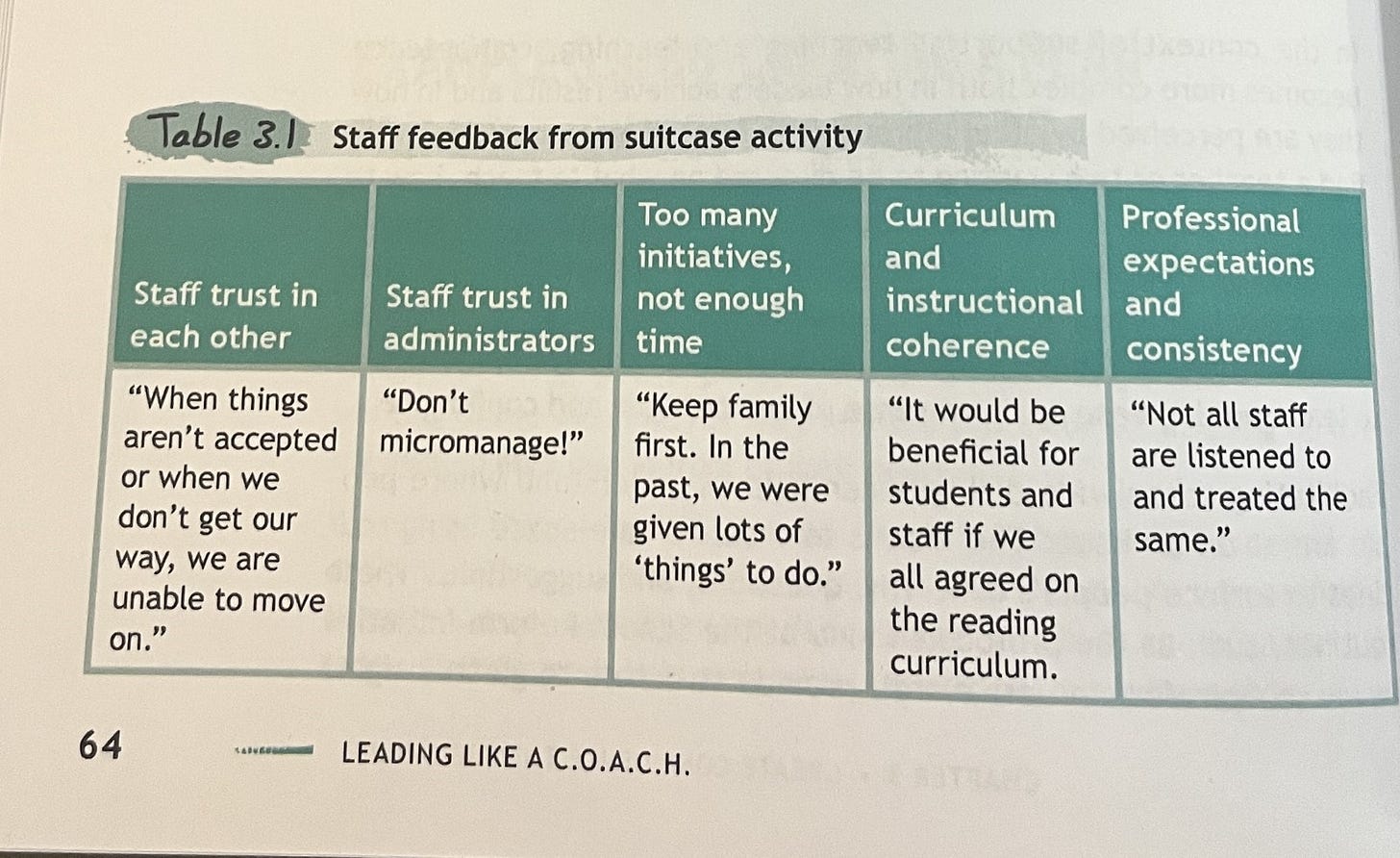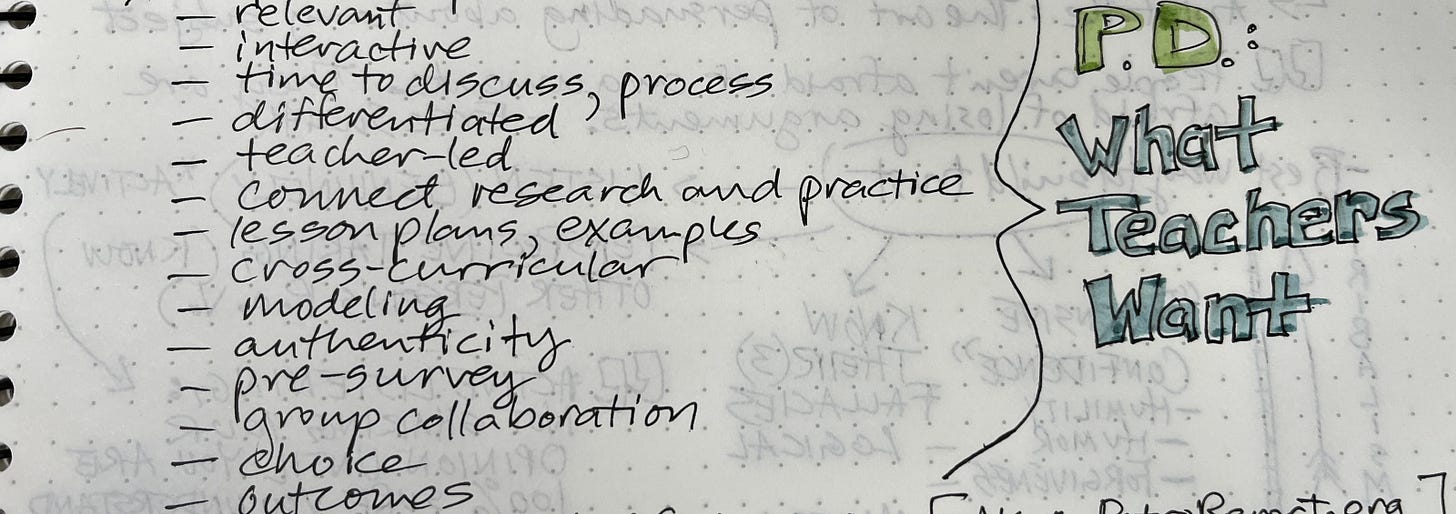Without Trust, Professional Learning is Just Compliance Theater
Including a simple staff activity that immediately builds trust
At a recent educational summit, teachers in the room were asked what was most important to them regarding professional development.
Below is what was shared aloud.
Curious, I uploaded this list to Claude.ai and asked it if trust was a common thread. Here is the response:
Absolutely. Trust is woven throughout this list, though it's expressed in the language teachers actually use rather than explicitly naming "trust."
Look at these indicators:
"Teacher-led" and "choice" - These signal trust in teachers' professionalism and judgment. When PD is imposed without input, it communicates distrust in educators' ability to identify their own learning needs.
"Authenticity" - This is perhaps the most direct trust indicator. Teachers want genuine, honest professional learning, not the performance they've experienced too often.
"Time to discuss, process" and "group collaboration" - These require psychological safety. Teachers won't engage in meaningful discussion or vulnerable collaboration without trust that their ideas won't be judged or dismissed.
What's telling is that trust isn't listed as a separate item - it's the foundation that makes everything else possible.
I wondered if I had prompted Claude in a way that generated a biased response, toward what I wanted to see. I followed up with Claude, asking it if it would have teased out “trust” as a common thread if I just uploaded these responses from teachers about preferred P.D.
Honestly? Probably not immediately.
Looking at that list cold, without context, I likely would have identified themes like "teacher agency," "relevance," or "collaborative learning" first. Trust is the deeper infrastructure that enables all of these, but it's not explicitly named.
I share this process as A.I. is not the answer to every problem we encounter in education. It doesn’t understand our specific contexts. It may confirm what we may want to hear due to poor prompting and lack of clear directions on our part. Additionally, it's becoming a quick fix for work that demands deeper thought. I can see leaders asking A.I. to “generate a yearlong plan for professional learning” and not thinking about the actual and specific needs of a building.
To be fair, while A.I. has its limits, it can provide powerful insights once it fully understands our situations and questions. Yet if A.I. is not seeing trust as a core thread in these responses, what’s the likelihood we as literacy leaders will not either?
This was evident in a recent online principals' group. A new leader asked, “First year Principal: 3 days of PD coming up. What do I do?”
Consider what happens when we treat this question like an AI prompt. Unless we have provided our LLM of choice with enough context about our school and trained it to follow up with questions, what will be generated will unlikely lead to schoolwide improvement.
Professional development is not just about what we do. It’s also about creating the conditions in which teachers trust what is shared and learned.
When trust is absent, quiet resistance and apathy fill the void. Having facilitated some less-than-stellar professional development in the past myself, I have seen the symptoms:
Friendly nods at the appropriate time, but body language that communicated disengagement
Lack of authentic and honest responses when requesting participation
Unproductive questions such as “Why are we doing this?”
This was often due to not first building trust with faculty. You can refer to this as “compliance theater”: teachers mentally checking the P.D. box so they can get back to their classrooms.
So how can leaders build trust on Day 1? By acknowledging the people in the room: their concerns, their goals and interests, and the broader needs of the school community.
Here's one place to start. When I became principal at a new school, I knew there were trust issues. The building had cycled through six principals in ten years. Starting with literacy instruction content wasn't what was needed.
So, with advice from my superintendent, I set up an open suitcase on a table at the front of a staff meeting. I asked the teachers to write down all their concerns on individual sheets of paper. They put these anonymous complaints in the suitcase. Then I shut it in front of them and said, "These are my concerns now. You can focus on teaching."
Afterwards, I read through each concern and organized them under different themes and categories. This became my list of problems that I systematically worked to address during the school year.

When a problem was solved or at least reconciled, I let the staff know. For example, I made a point of meeting with every teacher individually in the fall. I listened to their goals and hopes for the year. Later, I summarized what I heard as a collective group and shared those insights in a staff newsletter. “Professional expectations and consistency” were a priority.
I realize this is not "PD" in the truest sense. But I also know that until teachers can mentally let go of whatever was bothering them, it is difficult to focus on professional learning. Trust starts with us. By creating the conditions for active listening and continuous learning, teachers are more likely to engage in professional development.
Some questions for you:
Reread the list at the beginning of this article. Do you agree that trust is the common thread for what makes for successful professional development? What might you add to the list?
Have you tried A.I. for analysis and other deeper-level tasks? What was the result? How might you use it to enhance instead of replacing your professional learning plan?
If you were to facilitate the suitcase activity, what concerns do you think would be expressed? If you are unsure about trying it out, what’s holding you back? Unpack that fear.



